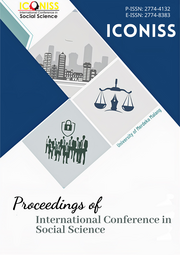Effectiveness of Work Training Programs in Improving the Quality of Human Resources (Study at the Manpower Office of Batu City)
DOI:
https://doi.org/10.26905/iconiss.v3i1.9039Keywords:
Effectiveness, Implementation of training programs, Quality of human resourceAbstract
Batu city is considered to be one of the cities that has a fairly high number of open unemployment. According to the Central Bureau of Statistics, unemployment in Batu City has increased by 5.84%. So that the quality of the workforce increases and can compete with a competent workforce. Various training majors have been implemented and one of them is the office administration and hospitality department. On average, graduates from this training get jobs not in accordance with the majors that have been followed in the training. The purpose of this study was to determine whether the implementation of training was effective in improving the quality of human resources in Batu City. This research method uses quantitative research with descriptive analysis using a questionnaire as a data collection tool. These respondents were all training participants totaling 50 people. The results of this study can be concluded that an effective workforce training program can improve the quality of human resources. This can be proven by the results of the regression analysis.
Downloads
References
Abdullah, M. (2014). Manajemen dan Evaluasi Kinerja Karyawan. Yogyakarta: Aswaja Pressindo.
Anggara, S. (2012). Perbandingan Administrasi Negara. Bandung: Pustaka Setia.
Anthony, & Govindrajan. (2005). Sistem Pengendalian Manajemen. Jakarta: Salemba Empat.
As'ad. (1987). Psikologi Industri. Yogyakarta: Liberty.
Bernard, S., Cheatam, T., & Watt, J. (1992). Communication in Business. Asia: Simon & Suchuster.
BPS. (2020). Tenaga Kerja. Retrieved Desember 02, 2020, from Tenaga Kerja: https://www.bps.go.id/subject/6/tenaga-kerja.html.
Bungin, B. (2010). Metodologi Penelitian Kualitatif. Jakarta: PT. Raja Grafindo Persada.
Candra, M. (2017). Efektivitas Program Pelatihan Dalam UPTD Balai Latihan Kerja Binas Tenaga Kerja Transmigrasi Dan Sosial Kabupaten Blora. Journal Of Public Policy And Management Review, 6(3), 1-8.
Carrell, M., & Frank E. (1982). Personnel Management of Human Resources. London: Charles E. Merrill.
Decenzo, D., & Robbins, S. (2002). Human Resource Management. Seventh Edition. USA: Wiley.
Ghozali, I. (2013). Aplikasi Analisis Multivariate dengan Program IBM SPSS 21. Semarang: Badan Penerbit Universitas Diponegoro.
Hasibuan, M. S. (2007). Manajemen Sumber Daya Manusia Perusahaan. Bandung: PT. Bumi Aksa.
Hidayat. (2013). Konsep Dasar dan Pengertian Produktivitas Serta Interprestasi Hasil. Jakarta: LP3ES.
Kaswan, M. (2017). Manajemen Sumber Daya Manusia Untuk Keunggulan Bersaing Organisasi. Yogyakarta: Graha Ilmu.
Muhidin, A. (2009). Konsep Efektivitas Pembelajaran. Bandung: Pustaka Setia.
Nitisemito, A. (1996). Manajemen Personalia, Sumber Daya Manusia. Jakarta: Gholia Indonesia.
Notoatmodjo. (2010). Bisnis, Manajemen & Keuangan. Jakarta: Rineka Cipta.
Pasolong, H. (2008). Teori Administrasi Publik. Bandung: Alfabeta.
Sarwono, J. (2006). Metode Penelitian Kuantitatif dan Kualitatif. Yogyakarta: Graha Ilmu.
Siagian. (2008). Efektivitas Organisasi. Jakarta: Erlangga.
Siagian, S. (2002). Filsafat Administrasi. Jakarta: Gunung Agung.
Simamora, H. (2001). Manajemen Sumber Daya Manusia. Edisi III. Yogyakarta: STIE YKPN.
Simon, A. (2004). Administrative Behavior, Perilaku Administrasi: Suatu Studi tentang Proses Pengambilan Keputusan dalam Organisasi Administrasi, Edisi Ketiga, Cetakan Keempat. Jakarta: Bumi Aksara.
Steers, R. (1977). Efektivitas Organisasi. Seri Manajemen No. 47. Jakarta: Erlangga.
Sugiyono. (2017). Metode Penelitian Pendidikan (Pendekatan Kuantitatif, Kualitatif dan R & D). Bandung: IKAPI.
Suharto, A. A. (2012). Pengaruh Kualitas Sumber Daya Manusia, Komitmen Dan Motivasi Terhadap Kinerja Pegawai Pada Inspektorat Kabupaten Kediri. Jurnal Ilmu Manajemen, Revitalisasi, 1(3).
Sukirno, S. (1994). Pengantar Ekonomi Makro. Jakarta: PT. Raja Grasindo Perseda.
Taufiqurakhman. (2014). Kebijakan Publik. Pendelegasian Tanggungjawab Negara Kepada Presiden Selaku Penyelenggara Pemerintahan. Jakarta: Fakultas Ilmu Sosial dan Ilmu Politik Universitas Moestopo (Pers).
Waluya, B. (2009). Sosiologi (Melayani Fenomena Sosial Di masyarakat). Jakarta: Pusat Perbukuan, Departemen Pendidikan Nasional.
Winarno, B. (2007). Kebijakan Publik: Teori dan Proses. Yogyakarta: Med Press (Anggota IKAPI).
Yanti, A. T. (2017). Analisis Program Pelatihan Kerja. Jurnal Umrah, 1-15.
Zhalfa Z., T. (2020). Efektivitas Pelatihan Kerja (Studi Kasus Balai Latihan Kerja Kota Jambi). Skripsi.
Downloads
Published
Issue
Section
License
Authors who publish in this journal agree to the following terms:
(1)Â Copyright of the published articles will be transferred to the journal as the publisher of the manuscripts. Therefore, the author confirms that the copyright has been managed by the journal.
(2) Publisher of Proceedings of International Conference in Social Science is the University of Merdeka Malang.
(3) The copyright follows Creative Commons Attribution–ShareAlike License (CC BY SA): This license allows to Share — copy and redistribute the material in any medium or format, Adapt — remix, transform, and build upon the material, for any purpose, even commercially.

